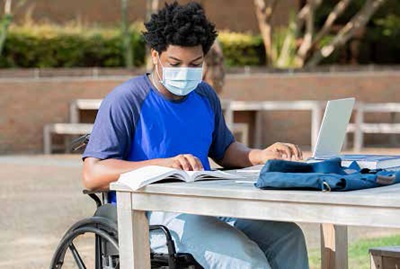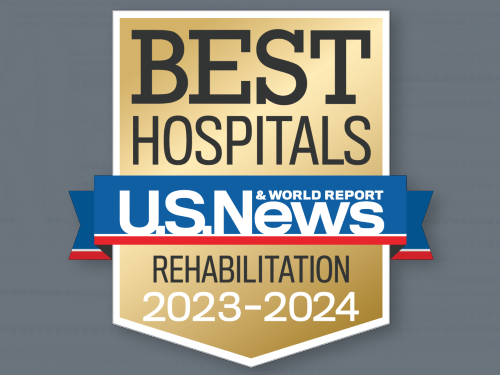COVID-19 has affected everyone, but one segment of the population has encountered a unique set of challenges in navigating the pandemic. People with disabilities often have additional hurdles to clear as services have shut down due to the health crisis.

ILRU has stepped up during COVID-19 through its IL-NET National Training and Technical Assistance (T&TA) Center for Independent Living, providing specialized technical consulting and training related to the virus for the nearly 500 Centers for Independent Living (CILs) and the 56 Statewide Independent Living Councils (SILCs) in American states and territories.
“CILs support people with disabilities so that they can live in the community, and many services are provided face to face,” says Petty, “All organizations that do this kind of work have had to pivot and find other ways to stay in touch with the people they serve, including web-based apps like Zoom and more low-tech forms of communication like phone calls and mail. We’re continuing to help CILs address social isolation, food insecurity and other challenges the virus has created for home-based services. We’ve also helped people find ways to access telehealth.”
We’re continuing to help CILs address social isolation, food insecurity and other challenges the virus has created for homebased services. We’ve also helped people find ways to access telehealth.
To help Centers for Independent Living adapt to the new environment and succeed, ILRU has presented four webinars: CIL Response to COVID-19; Technology Options for CILs During the COVID-19 Pandemic; Statewide and Systemic Responses to COVID-19 and Other Emergencies for CILs and SILCs; and Early Findings on COVID-19 Research About CIL Responses to the COVID-19 Emergency. The webinars were well attended, with 690, 550, 250, and 111 participants.
Using Surveys to Discover Needs

“From the surveys, we’ve discovered that the biggest pandemic concerns of our consumers are health and health care, limited access to personal protective equipment (PPE), inability to see providers face to face, medical equity for people with disabilities, access to personal assistance, food, housing, and income,” Curtis says. “The biggest concerns of staff members at CILs are health and safety, stress, caregiving responsibilities, and job security.”
“Early on, a number of CILs reported people experiencing food insecurity because the systems people had set up to get food into their homes had been disrupted by the pandemic,” Petty says. “We’re seeing that CILs have been providing PPE for clients and caregivers, and ensuring that the organizations that employ caregivers are living up to their responsibilities in this area.”
When ILRU sent out the new uses of technology survey in April, they were hoping to help CILs transition into providing most services remotely. “We had a great response, and about 95% of those who responded said they were providing services remotely, but about half that number felt some services had to be provided in person,” Curtis says. “The CILs were using technology, but they found that many consumers didn’t have computers, smartphones or internet access, so they had to shift gears. The work we have done is helping them devise new strategies to provide service to consumers and address their organizational challenges related to staff working remotely.”
Disability Rights Laws During the Pandemic
The ILRU’s Southwest ADA Center is the Southwest’s leading resource on the Americans with Disabilities Act and related disability rights laws. The Center is part of the ADA National Network funded by the National Institute on Disability, Independent Living and Rehabilitation Research (NIDILRR).

“Employers have called to ask if they can require customers to wear masks,” Nguyen says. “Businesses have always had the right to set conditions on customers. We know that as the ‘No shirt, no shoes, no service’ law. Even if there is no state law enforcing mask wearing, businesses can enforce it. We presented a webinar on the topic with 1,000 attendees, most of whom were from business establishments and were confused about whether they had the right to set the rules.”
During pandemics, health care providers and government officials may have to decide how to allocate limited health care resources if the entire population cannot be served. “This has created concern in the disability community because people with disabilities are generally perceived to have weaker immune systems and underlying conditions that may require health care providers to use more effort, time, space and scarce medical resources for treatment,” Nguyen says. “With PPE and new treatments for COVID-19 more readily available than they were in the first few months of the pandemic, we hope rationing of health care services won’t be necessary.”
Regarding return-to-work issues, people with disabilities have rights under the ADA and can ask their employers to accommodate their health needs. However, employers do not have to accommodate an employee who does not have a disability and is afraid to bring the virus home to a vulnerable family member.
The Southwest ADA Center operates a hotline as part of the national network. For answers to questions related to disability law, call 800.949.4232. The ILRU also has posted COVID-19-related announcements daily through much of the pandemic. Links to the webinars are available at ilru.org; follow the link “Communication to the Field on COVID-19.”
On Telework and Telemedicine
Now that many companies are taking advantage of telework to remain productive, people with disabilities could benefit, in the view of Lex Frieden, director of the ILRU and professor of health informatics in the School of Biomedical Informatics and professor of physical medicine and rehabilitation at UTHealth.
“Many people with disabilities have been given the opportunity to excel in the new telework environment,” Frieden says. “Because of their disabilities, they already have learned how to function well using online communication. Many have become leaders in the telework environment and are teaching others how to organize their time.”
COVID-19 has also made telemedicine a necessity. “Health care providers have been building out telemedicine capability so quickly that they’re still learning how to use the platforms effectively,” he says. “When it comes to removing barriers to health care access, telemedicine has a lot of promise.”
